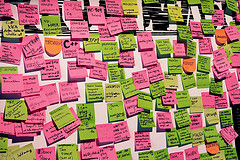“It used to be my little secret, my secret that is until I found out that many of the writers I know practice the same habit. We love to read the dictionary. Many times I have pulled out the dictionary to look up the spelling of a particular word and then another word on the page catches my eye. Twenty minutes later I am still engrossed in the dictionary, browsing through the less familiar definitions.” —Creating Copy by William Ackerly
 It’s true for more than just advertising copywriters: people love the serendipity of a dictionary. They like to get lost for a while, to be distracted, to learn something new.
It’s true for more than just advertising copywriters: people love the serendipity of a dictionary. They like to get lost for a while, to be distracted, to learn something new.
We like to do that, too, so we’ve made many ways to explore Wordnik.
For example, you can explore another user’s lists. You can look at the related items for a word. You can check out zeitgeist and see what other words people are visiting right now.
But for my money, tags are the feature that offers the most subtle pathways to the unexpected. You can find tags on the right-hand side of a word’s main page.
There’s nothing particularly Linnaean about tags. They’re not meant to be universal. No governing body is going to insist on a hierarchy, a structure, or a form. Unlike Wordnik lists, which can have a mission statement (such as “words I found while reading Great Expectations by Charles Dickens“), tags’ intentions are usually silent.
Tags are personal. They are a way of classifying a word in a way that suits you. Beyond “don’t be a knucklehead,” there aren’t really any rules. You can use short tags, long tags, tags in other languages. You can tag a lot or a little. You can let that basic human need to sort and organize take over. Tag like a maniac in any way that is useful to you or the world.
In lieu of rules, I offer two tag guidelines that have been helpful to me:
1. Make your tags true as far as you know.
2. Make your tags memorable to you.
That way, you’ll have left clues for yourself (if you forget the word) and for other serendipiters who come across the same word. (See, I used a new word there and then tagged it with “neologism.”)
Tags are so personal that often the only obvious intention behind a tag is to demonstrate a connection between two words. For example, if someone tags the word basilect with language, then there’s a pretty good chance that basilect has something to do with language. That’s about as much as we can glean.
However, if someone tags the word language with cvccvvcv, most people are going to be mystified. It doesn’t even look like a word! But there was indeed a connection there for somebody, and, it turns out, the tags are useful if you need to know something about the orthography of a set of words. (Hint: each “c” stands for “consonant” and each “v” stands for “vowel.” Full explanation here.)
Remember that a word can both be tagged and can be a tag itself. At the top of every word’s tag page you’ll see “words tagged” with the word you’re looking at and at the bottom you’ll see “the word has been tagged.” Check out the tag page for neologism to see what I mean.
If you want a bit of guided serendipity, you can browse the tags made by any user who has a public profile. Here are some of mine.
If you’re looking for a little more about tagging from an insider’s point of view, I recommend the book Tagging: People-powered Metadata for the Social Web.
Happy tagging!
Photo by Paula Rey. Used under a Creative Commons license.


